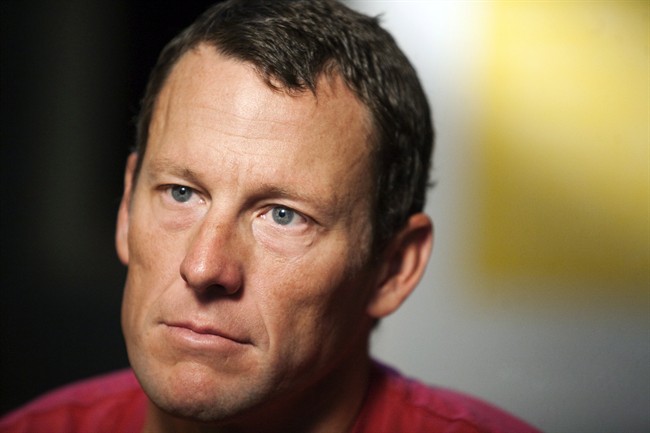AUSTIN, Texas – The Livestrong cancer charity is reporting a sharp drop in donations and revenue after founder Lance Armstrong admitted taking performance-enhancing drugs during most of his record-setting cycling career.

In federal forms released this week, Livestrong noted its 2013 donations dipped 34 per cent, from nearly $23 million to $15 million after Armstrong’s televised admission to Oprah Winfrey in January 2013. Total revenue also took a 38 per cent dive after commercial sponsorships were cancelled or not renewed.
Without specifically referring to Armstrong, Livestrong blamed the financial downturn on fallout from “revelations and disclosures” made in January 2013.
Armstrong, a cancer survivor, started the charity as the Lance Armstrong Foundation in 1997. He was removed from its board of directors in late 2012, around the same time the foundation changed its name.

Get daily National news
A Livestrong spokeswoman did not immediately return a telephone message seeking comment. Livestrong President Doug Ulman thanked supporters in a letter titled “Never Give Up” and posted online Wednesday.
“Because of your support, you helped us weather a tough period and move to the next phase of our evolution,” Ulman wrote.
READ MORE: Judge orders Lance Armstrong to answer doping questions
Despite the downturn, Livestrong last month agreed to give $50 million over 10 years to the University of Texas’ new medical school for a program emphasizing “patient-centred” cancer care.
- American sportscaster Greg Gumbel dies from cancer at age 78
- ‘Devastating’: Canada loses 3-2 to Latvia in stunning upset at world juniors
- Carolina Panthers’ Chuba Hubbard has chance to break NFL record for Canadian players
- Halifax Thunderbirds player suspended by team after video shows fans attacked in Colorado
Livestrong’s donations have fallen 63 per cent from $41 million in 2009, the year Armstrong came out of retirement and finished third in the Tour de France. He won the race seven times, only to have those titles later stripped away after his doping admission.
Daniel Borochoff, founder of CharityWatch, which analyzes the work of approximately 600 charities, said the sharp decline last year was expected.
“It is a big hit,” Borochoff said. “Not to say they won’t be able to recover as time goes by. It’s fresh in people’s mind.”
Livestrong was particularly vulnerable to the scandal surrounding its founder because the popularity of both was so deeply connected. Armstrong’s doping revelations led big corporate sponsors and partners such as Nike and Dick’s Sporting Goods to flee by either cancelling contracts or not renewing them. For corporations, the taint of doping was too strong to stay, and individual donors were angry, Borochoff said.
“People go through a mourning process when they hear of the scandal. They were a big supporter, he was a big hero and they were fans. Then you’re embarrassed and ashamed. It’s a lot of emotions,” Borochoff said. “Later, your rational facilities take over and realize the organization serves a worthy purpose, that it is not a man and can bring in new leadership.”





Comments